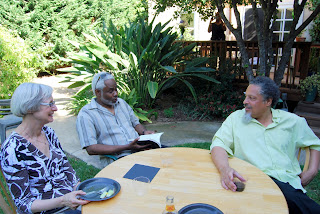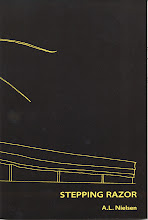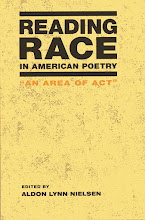




Since getting my first Amazon Kindle, I've advised the curious who have asked me that unless they were likely to use a Kindle on a daily basis, it would be wise to wait for a second iteration of the device, likely to be both improved and less expensive. I was thinking of the anger many early adopters of the iPhone felt at the way they'd been suckered by Apple.
Amazon turns out to have learned both the good and the bad of product improvement and release from Apple. A while back they offered the Kindle 2, which was indeed improved, but was no less expensive. I held off, quite pleased with my original Kindle. Then Amazon released the larger format DX, shortly thereafter dropping the price of the standard issue Kindle.
Take that, early adopters.
But I made a quick calculation, realized that my first Kindle had already more than paid for itself just in the savings its electronic versions of my newspaper and magazine subscriptions had brought me over the hard copy delivery price, and so I put my name on the list to get one of the first DX devices.
Like the Kindle 2, the DX has a slightly improved e-paper system. It didn't seem to me that the page-turn was significantly faster. On the other hand, the device proper is faster; in particular, the download time for my newspapers, magazines and books is markedly imrpoved.
I really like the larger format screen -- It has been advertised as being specially designed for newspaper and magazine reading, but what I like is that it makes the book reading experience more like a "real" book -- reading on the first Kindle was not as annoying as trying to read a book on my cell phone, but it was still a mild annoyance to have to do a page turn every paragraph or so. Having just finished reading the Michael Thomas novel Man Gone Down in its Kindle version (which now keeps tab at the bottom of the screen on what percentage of the total text you have read so far), I can report that the reading experience is even more comfortable than on the earlier model. Further, when I am giving a lecture somewhere, I like to use my Kindle as a sort of teleprompter. This bigger screen is ideal for the purpose. I much prefer this to reading from a laptop perched on the lectern.
Here are the cons, in my view: Amazon is all too Apple-like in its approach to marketing and pricing. The prices of many of the books are creeping upwards. Likewise, the small price Amazon charges for emailing your documents for conversion to your Kindle is creeping up. It's insulting to early adopters to drop the price of the Kindle after just a few months (though I suppose early adopting has to be seen as its own reward any more). Also like Apple, Amazon has now sealed off the battery so that you cannot replace it yourself. While the new battery lasts longer than the original, this is still entirely unacceptable. With the original Kindle, I could carry a spare battery to switch out when I didn't have an opportunity to recharge the device. Truly heavy users will miss this option. It's true that the battery will last a long time if all you do is read -- but if you are using the download function at all you will drain the battery much more quickly. Amazon has also eliminated the memory card slot that was on the original (and let me add that the "cons" I am listing were all introduced with the Kindle 2). The memory of the DX is impressive; this thing can hold an entire library. Still, I miss being able to carry odd things on the memory card and poping it in and out at will.
Neither pro nor con, the feature that will "read" a book out loud to you. If your text has any sort of specialized vocabulary, you will get a good laugh from listening to Kindle's pronunciation. This thing is not going to replace audio books any time soon. But this won't be a terribly important feature to many people anyway. Though I hasten to add that I look forward to the day when an improved Kindle will read BEING AND TIME to me as I drive to the beach.
But there are many "pros" in addition to the faster download speed and the larger screen. You can load PDFs directly to the device and read them "natively" now. (And you can still email document files to the device that will be converted to Amazon's peculiar format.) The new arrangement of the keys and buttons makes it far less likely that you will change pages accidentally. Some users have complained about the smaller buttons on the keyboard, but I find them easier to use than the earlier buttons. The highlighting function is much improved now. You can highlight exactly the passages you want, rather than the boxes you were stuck making on the old one. And one of the neatest tricks the DX does is that, like the newer cell phones, you can turn it on its side and use landscape view. That is good for reading many graphs, but also, as you can see in the illustration, makes this a great device for reading, of all things, music. The cover that came with the original Kindle was pathetic, so they started selling the Kindles without covers! I had purchased a really cool leather cover for my old Kindle from a British company. Amazon now sells its own leather cover for the DX -- it's pricey, but it's nice. I would advise getting one, though I'm sure somebody will start marketing an even more impressive cover shortly.
Things Amazon needs to do for us:
Rejigger the audio book function. At present it only works with one proprietary audio book company's product. Anything else you have to put on the device as an MP3 and listen to the same way you'd listen to music.
Go back to a removable battery and memory card.
AND MOST OF ALL, work with the publishers and convince them they should not follow the disastrous path of the recording industry. Unlike files you put on the Kindle yourself, books you buy from Amazon come in a ludicrous proprietary format, which means that you can't read them on any other device. E-books need to be like MP3 files, readable on ANY device, transportable from one machine to another. Yes, this means that someone can give a copy to someone else, but they are going to be able to do that anyway. Anything can and will be scanned and passed around in time. People who buy Kindles are people who already buy lots of books. They will buy even more if the experience is as easy and as portable as what we have had with the sturdy codex format all these generations.













































